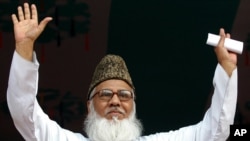Bangladesh's supreme court Thursday rejected an appeal of the death sentence given to Islamist party leader Motiur Rahman Nizami for war crimes during the country's 1971 independence struggle, meaning he could be hanged at any time in the coming days.
Nizami, the head of Bangladesh's largest Islamist party Jamaat-e-Islami, was convicted of genocide, rape, and orchestrating the massacre of top intellectuals. Prosecutors claim he was responsible for setting up Al-Badr, a pro-Pakistani militia which killed top writers, doctors, and journalists at the height of the conflict. Their bodies were found in a marsh on the outskirts of the capital, blindfolded and with hands tied.
Security has already been increased in the Bangladeshi capital Dhaka. The convictions of other Jamaat-e-Islami officials in 2013 sparked the country's deadliest violence in decades, leaving over 500 people dead, mostly in clashes between Islamists and police.
Nizami was sentenced to death in October 2014 by the International Crimes Tribunal, a controversial court established by Prime Minister Sheikh Hasina in 2010. Opposition politicians and non-profit organizations have accused the tribunal of victimizing her opponents. Four opposition politicians, three of whom belonged to Jamaat-e-Islami, have been convicted by the war crimes tribunal and executed since 2013.
The cases have been under scrutiny from many international rights groups that claim the trials fall short of global standards.
Nizami, 71, took over as the leader of Jamaat-e-Islami in 2000 and was a minister in the Islamist-allied government of 2001-2006.
A muslim-majority country, Bangladesh has recently seen a surge in violence against atheist bloggers, academics, religious minorities, and foreign aid workers. Just last month five people, including a univeristy professor and a gay-rights activist, were hacked to death by suspected Islamist militants.
The government blames Jamaat-e-Islami for the increase in violence, but the group has denied these allegations.





